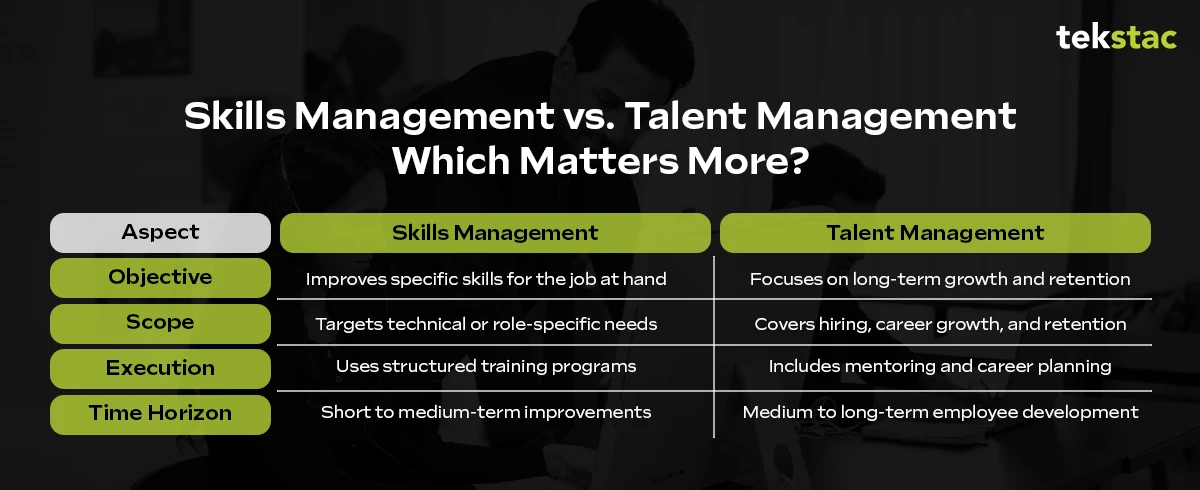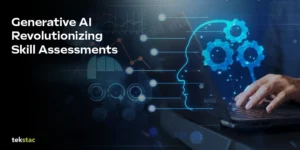Skills Management vs. Talent Management: What’s the Difference?

Blending Skills and Talent Management for Effective Team Success
Effective team management is not about choosing one method over another but blending strategies to ensure both immediate performance and long-term growth. Skills management focuses on honing specific abilities critical for current roles, while talent management emphasizes nurturing employees’ overall potential to support future organizational goals. Together, these approaches complement each other, creating a workforce that is resilient, capable, and prepared for the challenges ahead.
The Role of Skills Management in Workforce Excellence
Skills management is all about understanding what you and your team need to thrive in your roles and helping everyone grow in those areas. It starts with figuring out the gaps—what’s missing for you or your team to perform your best—and then creating targeted employee training programs to bridge those gaps.
When done right, it doesn’t just boost productivity; it builds stronger, more capable teams that are ready for anything. Take Amazon’s Career Choice program, for example. Amazon equips its employees with the tools to achieve their personal goals while meeting the company’s future needs.
But let’s be honest – it’s not just about sitting through lectures or flipping through manuals. Real learning happens when it’s hands-on. Practical training gives you the confidence and experience to handle real-world challenges. And with regular check-ins, you can see just how far you’ve come and whether the employee training programs are making a difference. This way, your team can adapt quickly to new projects or technologies without wasting any time.
Understanding Talent Management for Long-Term Growth
Skills management and talent management aren’t separate ideas—they’re two sides of the same coin. Talent management is all about nurturing your employees’ potential and supporting their long-term growth within your organization. It begins the moment they join your team and continues as they build meaningful careers aligned with your company’s goals.
A great example is Google’s focus on employee development, where programs like mentorship, leadership training, and growth-focused initiatives provide clear paths for career advancement. It’s all about helping your employees grow from their very first day and guiding them to build meaningful careers within your company. These strategies not only retain top talent but also foster innovation within the organization.
Did you know that 52% of employees who leave their jobs say their employer could have done something to stop them? People stay when they feel valued, appreciated, and see chances to grow. When you recognize their efforts and show them support, they’re much more likely to stick around and contribute to your success.
The Interplay Between Skills and Talent Management
To future-proof your workforce, integrating skills management and talent management is key. Skills management equips your team with the specific capabilities they need right now, ensuring operational efficiency. Talent management, on the other hand, focuses on nurturing long-term potential through mentorship, leadership development, and tailored career plans.
By aligning these strategies, you not only close skills gaps but also empower employees to grow in ways that directly support your business goals. This holistic approach helps you adapt to market changes, foster engagement, and retain top talent in a competitive landscape.
Challenges in Implementing Skills and Talent Management
Implementing skills and talent management isn’t easy, especially with the constant change in skills required to perform a role and the rapid evolution of technology. It can be challenging to pinpoint skill gaps and keep training programs relevant. Your employees may also disengage if they don’t see how the learning ties to their growth.
Aligning career advancement with your business goals adds complexity, as mismatches can lead to frustration. By using real-time tools to track trends, creating tailored development plans, and fostering a culture of growth, you can help your team stay prepared and motivated to succeed.
Skills Management vs. Talent Management: A Comparative View
Skills management and talent management share a common goal-building a strong workforce-but they approach it in different ways. Here’s how they compare:

Together, these two approaches form a balanced strategy. Skills management addresses immediate needs, while talent management ensures sustainable, long-term success for both employees and the organization.
1. The Rise of Skills-Based Talent Management
Skills-based talent management is changing the way companies think about their workforce. Instead of focusing on job titles, this approach looks at what employees can actually do. This approach prepares teams to navigate challenges and seize opportunities with confidence and agility.
This method helps organizations use their people more effectively. Employees are assigned tasks based on their abilities, not just their roles, which makes projects run smoother and faster. It also brings different talents together, encouraging teamwork and creative problem-solving.
2. Enabling Workforce Success Through Integrated Strategies
If you want your organization to succeed in today’s fast-changing world, you need a strategy that brings skills management and talent management together. This means using tools that enable effective skills gap analysis to give you a clear picture of what your team can do now and how they can grow. By addressing immediate needs while planning for the future, you’ll set your workforce up for long-term success.
With advanced learning and development systems, it’s easier than ever to create focused employee training programs that actually work. This approach doesn’t just improve productivity; it enhances employee engagement and ensures your organization stays competitive in a rapidly evolving marketplace.
Conclusion
Skills management and talent management are two complementary parts of a unified strategy for building a stronger workforce. Together, they ensure your employees are equipped with the skills they need today while fostering the growth required for tomorrow. Skills management sharpens capabilities for immediate tasks, and talent management aligns personal aspirations with organizational goals, creating a seamless pathway for success.
With tools like Tekstac’s advanced learning platforms, organizations can bridge skill gaps, foster career growth, and build a resilient workforce ready for the future. Take the next step in workforce transformation—explore Tekstac’s solutions today to set your team up for lasting success.
FAQs
1. What is the difference between talent management and talent development?
Talent management focuses on hiring, retaining and optimizing employees, while talent development enhances employees’ skills through training and mentorship. Talent development is a key part of talent management, ensures long-term growth and success.
2. How can organizations future-proof their workforce with skills and talent management?
By leveraging skills gap analysis, tailored learning programs, and career development initiatives, companies can ensure employees stay adaptable and aligned with evolving business needs.
3. What is the difference between Talent Management and Learning & Development in HRM?
Talent management focuses on hiring, performance, and career growth, while Learning & Development (L&D) enhances skills through training. L&D is a key part of talent management, driving workforce growth and readiness.
4. What tools can help implement skills and talent management effectively?
Platforms like Tekstac’s advanced learning solutions enable organizations to analyze skill gaps, provide personalized training, and drive long-term workforce transformation.
5. How do skills management and talent management work together?
Skills management ensures employees have the right capabilities for immediate tasks, while talent management focuses on long-term growth through mentorship and career planning. Together, they create a balanced workforce strategy.





